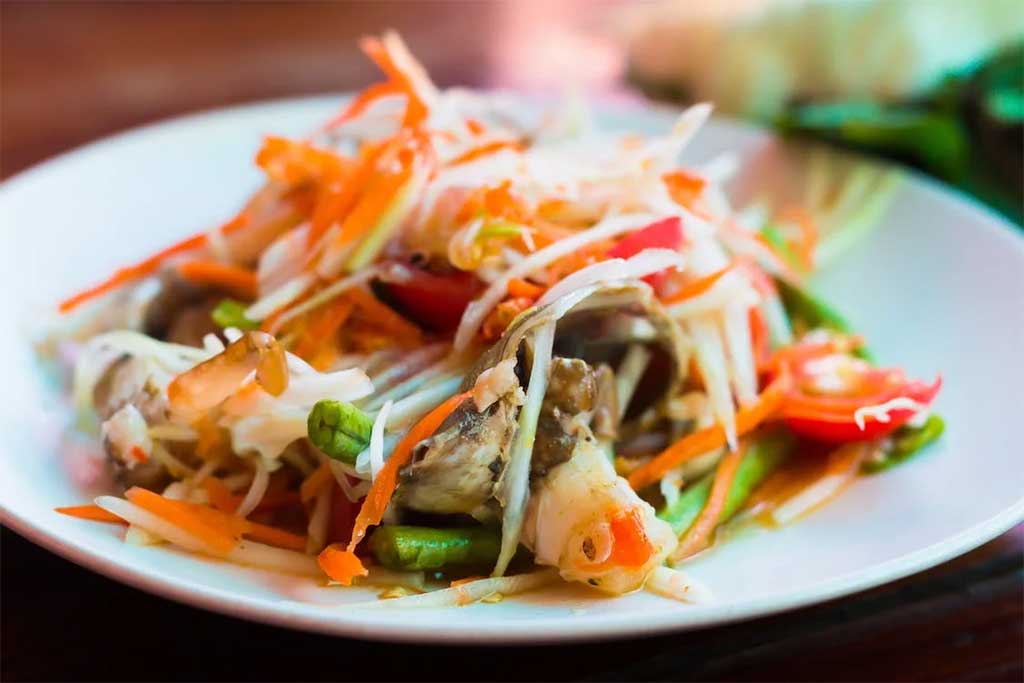Spicy Food Thai Cuisine
The use of chili peppers in Thai cooking is a defining aspect of the cuisine, and many dishes from Thai cuisine are well-known for the powerful and spicy flavors that they express. Chili peppers are an indispensable component of Thai cooking and are commonly incorporated into a diverse range of dishes with the goal of amplifying the level of spiciness and flavor they contribute.
In point of fact, many Thai dishes are rated on a scale of one to five, with one being the dish with the least amount of heat and five being the dish with the most amount of heat.
The dishes in Thai cuisine are not only known for their high levels of heat, but also for their exquisite flavor balance. The use of herbs such as lemongrass, basil, and coriander, along with other ingredients such as lime juice, tamarind, and fish sauce, helps to provide a subtle and well-balanced flavor profile that pairs nicely with the heat of the chilies. One way to characterize this profile is as "complex and harmonious."
Some of the most popular spicy Thai dishes include
- Tom Yum soup
- Green Curry
- Papaya Salad (Som Tam)
- Spicy Basil Stir-Fry (Pad Kra Pao)
- Massaman Curry
On the other side, if you don't want things to be particularly spicy, you can always request that your food be cooked with less chili, or if you don't like the heat at all, you may ask for it to be made without any chili at all. Many Thai restaurants are ready to accommodate the wishes of their patrons for dishes that are not as spicy as some of their other offerings.
The benefits of Spicy Food!
Spicy food has been known to offer several health benefits, some of which include:
- Boosts metabolism: Capsaicin, the primary component in chili peppers responsible for its distinctively fiery flavor, has been shown to stimulate metabolic activity, which in turn makes it easier to shed extra pounds.
- Reduces inflammation: In addition, capsaicin has anti-inflammatory properties, which make it potentially useful in treating inflammatory conditions like arthritis and lowering ovaerall levels of inflammation in the body.
- Improves heart health: According to the findings of a number of studies, making spicy food a regular part of one's diet may be beneficial for lowering blood pressure as well as cholesterol levels, both of which are variables that contribute to the development of cardiovascular disease.
- Enhances digestion: It has been demonstrated that eating spicy food can stimulate the creation of digestive fluids and enzymes, both of which can help improve digestion and reduce the symptoms associated with indigestion.
- May have pain-relieving effects: In addition to the topical pain relief creams and patches that contain capsaicin, which is used in these treatments, some research suggests that consuming spicy food may also have pain-relieving effects. This would be in addition to the topical pain relief creams and patches that contain capsaicin.
It is vital to bear in mind that even though eating spicy food may have certain beneficial benefits on one's health, this does not automatically imply that it is appropriate for everyone to do so. Consuming spicy food may cause discomfort in the digestive tract or other unwanted effects in certain persons, particularly in those individuals who already have preexisting digestive disorders. This is especially true in those individuals who consume food that is exceptionally high in heat.
It is always a good idea to share your concerns about making any kind of changes to your diet with a skilled medical practitioner, especially if you are worried about how the change might affect your health.




